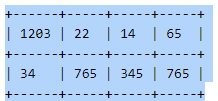使用特定的列值创建表
让我们再尝试一次。我有一列这样的数据:
现在,我需要一个代码来检查该列,省略特定值,即。 “开始”,“结束”,“否”,“ ”。如果该值不等于“开始”,“结束”,“否”,“ ” 而不是我想转置这些值以创建一个像这样的表:
对于代码,我发现了这一点,并根据自己的目的对其进行了调整。它不起作用,因为它不会忽略不需要的值,而是删除它们所在的行,所以我猜它可能对我有用。仍然想知道如何将其转置到表格中。
Sub Deleteunwanted()
Dim lRow As Long
Dim iCntr As Long
lRow = 17
For iCntr = lRow To 1 Step -1
If Cells(iCntr, 1) = "Start" Or Cells(iCntr, 1) = "*" Or Cells(iCntr, 1) = "NO" Or Cells(iCntr, 1) = "END" Then
Range("A" & iCntr).Delete Shift:=xlUp
End If
Next
End Sub
2 个答案:
答案 0 :(得分:0)
尝试此代码
import pandas as pd
data = pd.read_excel('file.xlsx')
mydf = data.groupby[['First','Second']].sum()
答案 1 :(得分:0)
我认为仍然需要回答一些问题(请参阅我的评论),但以下是一些假设的起点。
1)我将输出表的列数保留在一个常量变量中,以便您可以选择所需的列数:
Const numberOfColumnsInTable = 4
2)我列出了要忽略的项目列表并将其存储在数组中,以便您可以轻松扩展/修改选择范围:
wordsToExclude = Array("NO", "*", "Start", "END")
3)我将所有列数据存储在从图纸读取的2D数组中。这比循环处理工作表要快得多。
4)我循环输入数组的第一维(arrayIn),检查是否在数组中找到了当前值。如果未找到,将引发我检查的错误。
IsError(Application.Match(arrIn(i, 1), wordsToExclude, 0))
如果出错,则保留该值并将其存储在输出数组(arrayOut)中。
5)我将输出数组重新划分尺寸,只填充到填充的行,然后写入工作表。
代码:
Option Explicit
Public Sub OrderInTable()
Dim ws As Worksheet, arrIn(), arrOut(), i As Long, wordsToExclude(), rowCounter As Long, columnCounter As Long
Dim counter As Long
Const numberOfColumnsInTable = 4
wordsToExclude = Array("NO", "*", "Start", "END")
Set ws = ThisWorkbook.Worksheets("Sheet13")
With ws
arrIn = .Range("A1:A" & .Cells(.Rows.Count, 1).End(xlUp).Row).Value
ReDim arrOut(1 To UBound(arrIn, 1), 1 To numberOfColumnsInTable)
For i = LBound(arrIn, 1) To UBound(arrIn, 1)
If IsError(Application.Match(arrIn(i, 1), wordsToExclude, 0)) Then
counter = counter + 1
If counter Mod numberOfColumnsInTable = 1 Then
rowCounter = rowCounter + 1: columnCounter = 1
Else
columnCounter = columnCounter + 1
End If
arrOut(rowCounter, columnCounter) = arrIn(i, 1)
End If
Next
arrOut = Application.WorksheetFunction.Transpose(arrOut)
ReDim Preserve arrOut(1 To numberOfColumnsInTable, 1 To rowCounter)
arrOut = Application.WorksheetFunction.Transpose(arrOut)
.Range("C1").Resize(UBound(arrOut, 1), UBound(arrOut, 2)) = arrOut
End With
End Sub
相关问题
最新问题
- 我写了这段代码,但我无法理解我的错误
- 我无法从一个代码实例的列表中删除 None 值,但我可以在另一个实例中。为什么它适用于一个细分市场而不适用于另一个细分市场?
- 是否有可能使 loadstring 不可能等于打印?卢阿
- java中的random.expovariate()
- Appscript 通过会议在 Google 日历中发送电子邮件和创建活动
- 为什么我的 Onclick 箭头功能在 React 中不起作用?
- 在此代码中是否有使用“this”的替代方法?
- 在 SQL Server 和 PostgreSQL 上查询,我如何从第一个表获得第二个表的可视化
- 每千个数字得到
- 更新了城市边界 KML 文件的来源?

